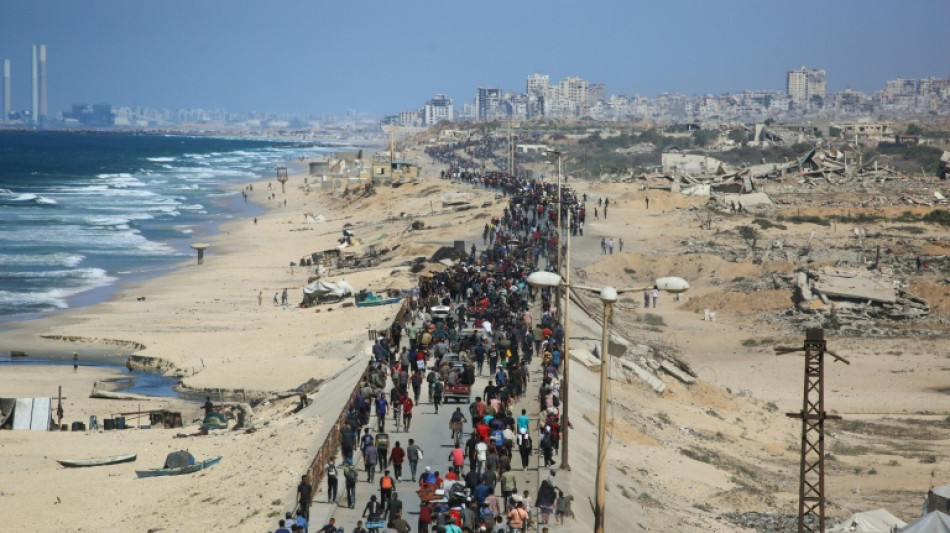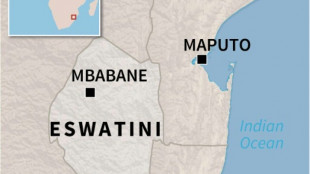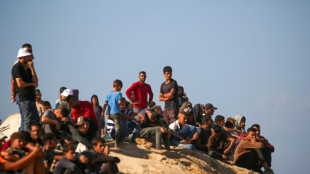

Israel ceases fire and Gazans start to trek home
Israel declared a ceasefire and started pulling back troops in Gaza on Friday, as thousands of displaced Palestinians began to trek back to their wrecked homes.
After two years of brutal war, the families of Israel's remaining hostages in the territory were also hoping the truce -- pushed by US President Donald Trump -- would hold.
The Israeli army said its troops had ceased fire at noon (0900 GMT) "in preparation for the ceasefire agreement and the return of hostages".
Three hours later, the US Pentagon confirmed Israel had completed the first phase of a pullback laid out in Trump's peace plan. Israeli forces still hold around 53 percent of the Palestinian territory.
The withdrawal set the clock running on a 72-hour deadline for Hamas to release the remaining hostages held in Gaza.
Israel, meanwhile, published the list of the 250 Palestinian prisoners it plans to release -- along with 1,700 Gazans detained since Hamas triggered the latest conflict on October 7, 2023, with a brutal cross-border assault.
As the ceasefire began, long columns of Palestinians, exhausted by two years of intense bombardment and what the UN has warned were famine conditions, began a trek back from the southern city of Khan Yunis towards their shattered homes further north.
The EU mission at the Rafah border point between Gaza and Egypt will be reopening a pedestrian crossing on October 14, Italy said.
Under the ceasefire deal, Hamas will hand over 47 hostages -- living and dead -- still held from the 251 abducted during the attack two years ago. The remains of one more hostage, held in Gaza since 2014, are also expected to be returned.
Gaza's civil defence agency confirmed that Israeli troops and armoured vehicles were pulling back from forward positions in both Gaza City and Khan Yunis.
But Israel warned some areas were still off-limits and that Palestinians should steer clear of its forces while they are "in the midst of adjusting operational positions in the Gaza Strip".
- 'Wounds and sorrow' -
"We're going back to our areas, full of wounds and sorrow, but we thank God for this situation," 32-year-old Ameer Abu Lyadeh told AFP in Khan Yunis.
Before dawn on Friday, Israeli Prime Minister Benjamin Netanyahu's office said the government had approved a framework of the hostage-release deal.
"Citizens of Israel, two years ago, the Simhat Torah holiday became a day of national mourning," Netanyahu said, referring to a Jewish festival that begins at nightfall on Monday.
"This Simhat Torah, with God's help, will be a day of national joy, celebrating the return of all our brothers and sisters held hostage," he said.
Israel had previously said all parties had signed the first phase of a ceasefire agreement at talks this week in Egypt, adding that Hamas freeing its remaining Israeli captives would "bring the end to this war".
Senior Hamas official Osama Hamdan told Qatar-based broadcaster Al Araby the Palestinian Islamist movement rejects the transitional authority.
Trump said the issue of Hamas surrendering its weapons would be addressed in the second phase of the peace plan.
Mohammed al-Mughayyir, an official from Gaza's civil defence agency, said the areas Israeli troops were withdrawing from were Tel al-Hawa and Al-Shati camps in Gaza City, both of which had seen intense Israeli air and ground operations in recent weeks, and parts of Khan Yunis.
- Joy and grief -
Residents of several areas of the Gaza Strip also told AFP the Israeli military appeared to have withdrawn from positions it held on Thursday.
Areej Abu Saadaeh, 53, who was displaced early in the conflict, was heading home between smashed piles of rubble and twisted steel, under a flat blue sky and clouds of cement dust.
"I'm happy about the truce and peace, even though I'm a mother of a son and a daughter who were killed and I grieve for them deeply. Yet, the truce also brings joy: returning to our homes," she said.
R.Schmidt--MP



